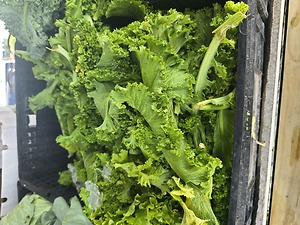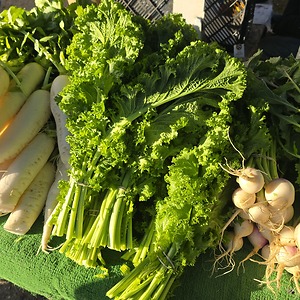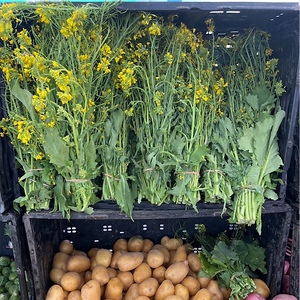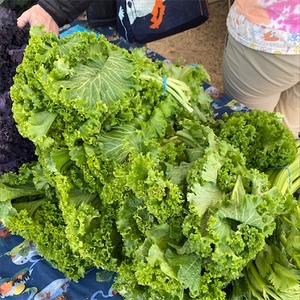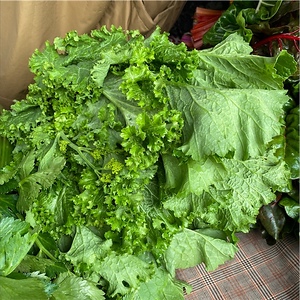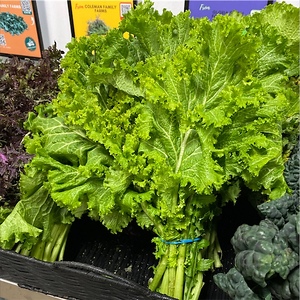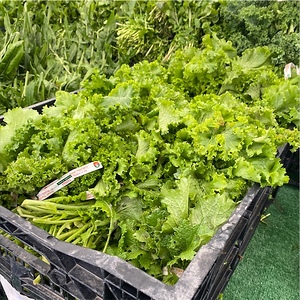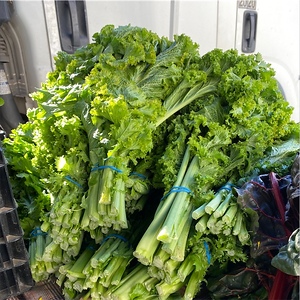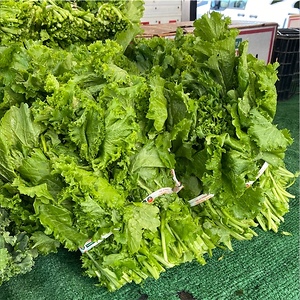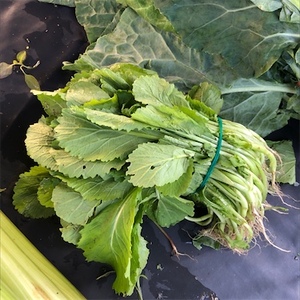

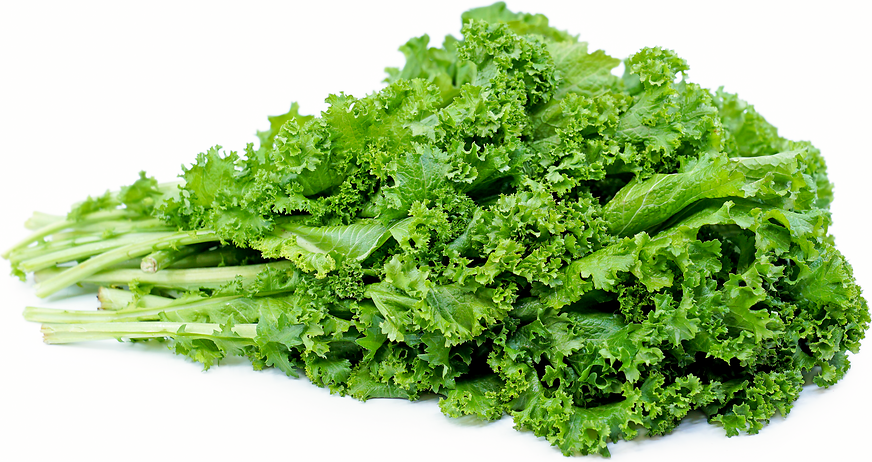
Mustard Greens
Estimated Inventory, 24 ct : 3.96
This item was last sold on : 07/08/25
Description/Taste
Mustard greens vary in size and shape, depending on the specific variety, and are generally harvested when they reach around 10 to 20 centimeters in length. The greens are preferred in their younger stages, as they will bear a more palatable flavor and texture. Mustard greens can be thin, broad, elliptical, and obovate in shape. Each variety will have stems ranging from thin and tender to thick and fibrous, and the leaves vary in green, red, purple, and yellow-green hues. Mustard greens may also showcase leaves with prominent veining, and the edges can be smooth, frilly, or serrated. The surface of the leaf is typically pliable and tender when young. The greens become tougher, more fibrous, and rough as they age. Mustard greens are edible raw when young and have a mild, peppery, green flavor. As they mature, their taste intensifies and becomes slightly bitter, vegetal, and grassy with a zingy, piquant undertone. Cooking helps to mellow their peppery and bitter flavors.
Seasons/Availability
Mustard greens are available year-round, with a peak season in the fall through spring.
Current Facts
Mustard greens, botanically classified as Brassica juncea, are a broad species belonging to the Brassicaceae family. Many different types of Mustard plants are grown worldwide for their edible greens. Mustard is a cool-season, fast-growing species favored among growers for its prolific, low-maintenance nature. Mustard greens are found in green, red, purple, and yellow-green hues, and most varieties can be harvested at their micro stage up through maturity. The leaves can be individually cut from the plants, and new growth will appear in their place, providing an extended season of fresh greens. Popular varieties of Mustard greens include Southern Giant, Ruby Streak, Florida Broadleaf, Amara, Osaka Purple, Red Giant, Mizuna, and Green Wave. The greens, in general, are also called Leaf mustard, Indian mustard, Chinese mustard, and Oriental mustard. In the modern day, Mustard greens are a common commercial crop worldwide and are versatile in adapting to a wide array of cuisines. Chefs and consumers appreciate Mustard greens for their zingy flavor and utilize the leaves fresh and cooked in culinary preparations.
Nutritional Value
Mustard greens are a source of vitamins A, C, E, and K to strengthen the immune system, guard the cells against free radical damage, aid in faster wound healing, and maintain healthy organs. The leafy greens also provide fiber to help improve digestion, potassium to balance fluid levels within the body, and iron to develop the protein hemoglobin for oxygen transport through the bloodstream. Other nutrients include calcium, manganese, copper, and folate. Calcium supports bone and teeth development in the body, while manganese helps the body produce connective tissues. Mustard greens also contain anti-inflammatory, antibacterial, and antiviral properties.
Applications
Mustard greens have a peppery, sometimes piquant flavor suited for fresh and cooked preparations. Young greens are preferred for raw dishes as they have a milder flavor and a more tender texture. These Mustard greens can be added to salads, folded into grain bowls, or mixed into legume dishes for added flavoring. Young Mustard greens can also be blended into sauces and dressings or layered into sandwiches and fresh spring rolls. In addition to raw preparations, Mustard greens are popularly stir-fried, sauteed, or braised. It is recommended to use more mature Mustard greens for cooked recipes as their tougher nature can withstand longer cooking times. Their stronger flavor also mellows with cooking, creating a palatable taste. Mustard greens are often added to egg-based dishes like quiche, omelets, scrambles, and frittatas or incorporated into pasta. In Asia, it is common to simmer Mustard greens in soups, stews, and curries. The peppery leaves also complement recipes with pork or tofu. Sarson ka saag is a famous northern Indian dish comprised of cooked spiced Mustard greens that are pureed and served with roti. Mustard greens are favored for their unusual flavor and can be combined with other dark leafy greens in simple side dishes with garlic and onions. The leaves can also be pickled as a tangy condiment. Mustard greens pair well with spices such as cumin, turmeric, garam masala, and chili powder, nuts including hazelnuts, pistachios, and pine, and herbs such as coriander, dill, and fennel. Whole, unwashed Mustard greens should be wrapped in paper towels and placed in a container in the refrigerator’s crisper drawer, lasting 3 to 4 days. It is recommended to immediately consume or prepare the greens for the best quality and flavor. Mustard greens are also blanched and frozen for extended use.
Ethnic/Cultural Info
Mustard greens are sometimes used as a symbolic bitter green in the Jewish Passover Seder. The annual meal is held on the first and sometimes second night of Passover and commemorates the story of the Israelites' freedom and exodus from Egypt. The Passover Seder is a meal comprised of six symbolic items that are acknowledged and consumed at specific times. Two of the items involve bitter herbs known as Maror and Chazeret. Serving bitter herbs is a reminder of the bitterness experienced when the Israelites were slaves in Egypt. Bitter herbs are eaten with the Passover lamb, a combination to acknowledge that there was no freedom or salvation without experiencing bitterness, suffering, and pain. Historically, it is said that romaine lettuce or chicory was the original Maror in the Seder. Over time, it became customary to include different bitter herbs, based on location and availability, and horseradish became the choice herb for Maror. Mustard greens are often served as Chazeret, an additional bitter herb eaten in the Seder.
Geography/History
Mustard greens are believed to be native to regions of Asia and Europe and have been growing wild since ancient times. The origins of the species are debated among historians as there are many types of Mustard plants, but the most prevalent theory is that the main species may be connected to areas within the Himalayas in India. Mustard greens are descendants of wild species that were domesticated over time for specific traits. Several varieties were cultivated throughout China and India, and over time, Mustard greens were spread across the rest of Asia and Europe. Mustard greens were grown and eaten in Ancient Greece and Rome, and later in the Middle Ages, the greens were prevalent in European markets. The species was also carried to the New World with European settlers sometime around the 16th century. Today, Mustard greens are grown worldwide, and many types are cultivated for culinary use. When in season, Mustard greens are sold through farmer’s markets, grocers, and specialty distributors. They are also grown in home gardens.
Featured Restaurants
Restaurants currently purchasing this product as an ingredient for their menu.
| Viejas Casino Grove Steakhouse | Alpine CA | 800-295-3172 |
| US Grant Hotel Grill | San Diego CA | 619-232-3121 |
| Carte Hotel | San Diego CA | 619-365-1858 |
| Cape Rey Carlsbad, a Hilton Resort | Carlsbad CA | 760-602-0800 |
| Kingfisher | San Diego CA | 619-861-8074 |
| Baja Cavi | Lomas de Valle Verde 22810 | 619-295-3172 |
| Azuki Sushi Lounge | San Diego CA | 619-238-4760 |
| Georges at the Cove | San Diego CA | 858-454-4244 |
| Lodge at Torrey Pines Main | San Diego CA | 858-453-4420 |
| Merenda | Oceanside CA | 703-459-4145 |
| Fairmont Grand Del Mar | San Diego CA | 858-314-1975 |
| Cutwater Spirits | San Diego CA | 619-672-3848 |
| Sheraton Carlsbad (Banquets) | Carlsbad CA | 760-827-2400 |
| The Wild Thyme Company | San Diego CA | 858-527-0226 |
Recipe Ideas
Recipes that include Mustard Greens. One



